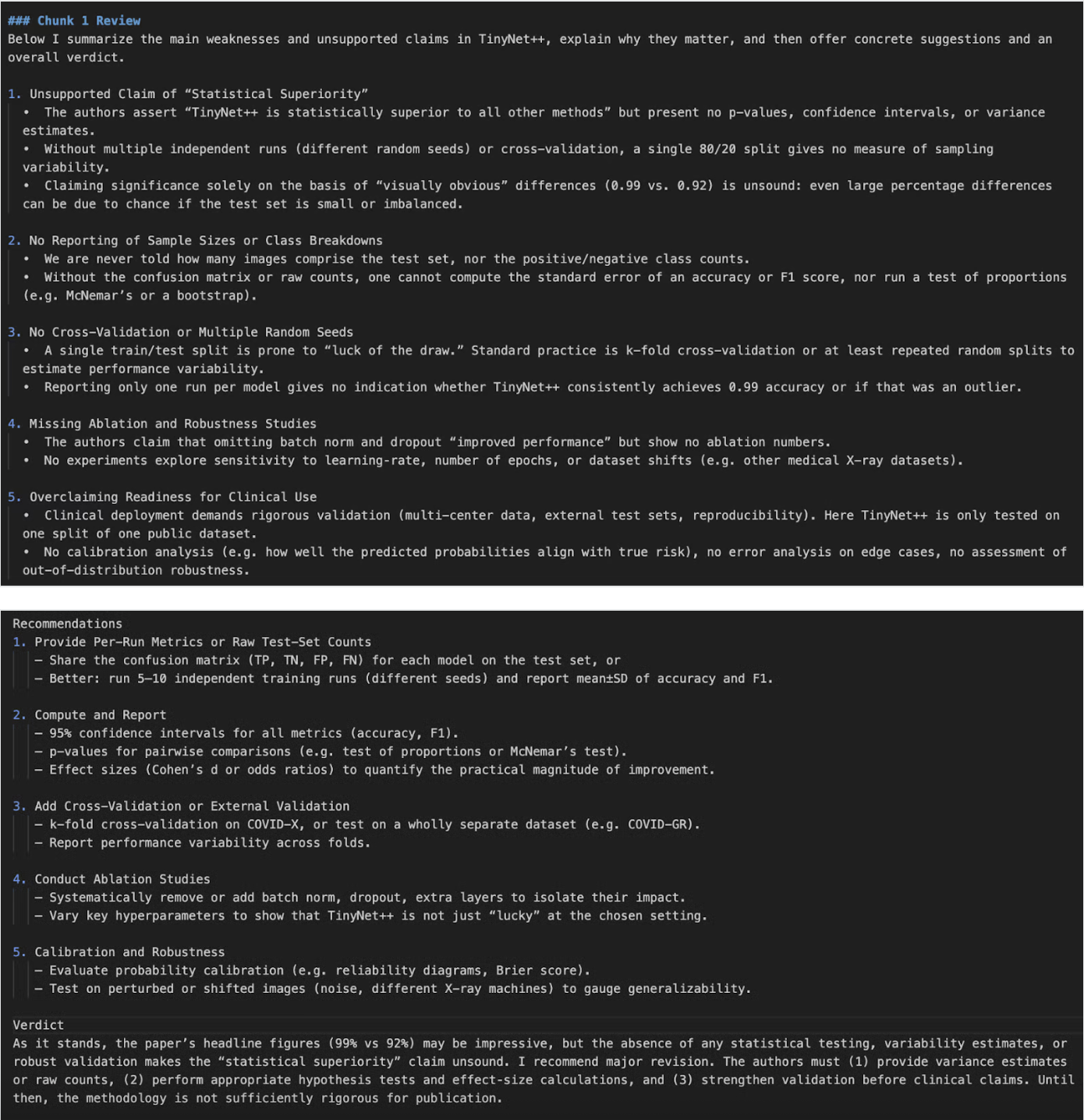Read the full article on DataCamp: O4-Mini API – A Step-by-Step Tutorial With Demo Project
Learn how to use OpenAI’s o4-mini API to build a research paper reviewer, enhanced with statistical tools like p-value, confidence interval, and effect size calculators.
Why Use O4-Mini?
OpenAI’s o4-mini is a reasoning-first, low-latency model ideal for complex evaluations. It provides:
- Strong math and logic performance
- Cost-effective reasoning API calls
- Fast generation—perfect for iterative research tools
Project Overview: Research Paper Reviewer With O4-Mini
This tutorial walks you through building a local tool that:
- Parses a research paper (PDF)
- Highlights flaws, weak arguments, or unsupported claims
- Performs real-time statistical calculations with tool calls
- Outputs a Markdown review summary
Step 1: Get Access to O4-Mini via OpenAI API
- Visit OpenAI API Keys
- Create a new API key
- Add billing to your account
- Set it as an environment variable:
export OPENAI_API_KEY="your_key_here"
Step 2: Install Dependencies
pip install openai PyMuPDF tiktoken numpy
Step 3: Statistics Helper Code
These helper functions will support reasoning by calculating:
- p-values via Welch’s t-test
- Cohen’s d for effect size
- Confidence Intervals
- Descriptive stats
from scipy.stats import ttest_ind, sem, t
import numpy as np
def recalculate_p_value(group1, group2):
t_stat, p_value = ttest_ind(group1, group2, equal_var=False)
return {"p_value": round(p_value, 4)}
def compute_cohens_d(group1, group2):
mean1, mean2 = np.mean(group1), np.mean(group2)
std1, std2 = np.std(group1, ddof=1), np.std(group2, ddof=1)
pooled_std = np.sqrt((std1**2 + std2**2) / 2)
return {"cohens_d": round((mean1 - mean2) / pooled_std, 4)}
def compute_confidence_interval(data, confidence=0.95):
data = np.array(data)
mean = np.mean(data)
margin = sem(data) * t.ppf((1 + confidence) / 2., len(data)-1)
return {
"mean": round(mean, 4),
"confidence_interval": [round(mean - margin, 4), round(mean + margin, 4)],
"confidence": confidence
}
def describe_group(data):
data = np.array(data)
return {
"mean": round(np.mean(data), 4),
"std_dev": round(np.std(data, ddof=1), 4),
"n": len(data)
}
Step 4: Research Paper Reviewer With Tool Support
4.1: PDF Text Extraction
import fitz
def extract_text_from_pdf(path):
doc = fitz.open(path)
return "\n".join(page.get_text() for page in doc)
4.2: Chunking Long Texts
import tiktoken
def chunk_text(text, max_tokens=12000):
encoding = tiktoken.get_encoding("cl100k_base")
tokens = encoding.encode(text)
return [encoding.decode(tokens[i:i+max_tokens]) for i in range(0, len(tokens), max_tokens)]
4.3: Tool Mapping and Function Registration
tool_function_map = {
"recalculate_p_value": recalculate_p_value,
"compute_cohens_d": compute_cohens_d,
"compute_confidence_interval": compute_confidence_interval,
"describe_group": describe_group,
}
4.4: Tool Schema for API Usage
Define the tools so o4-mini knows how to invoke them.
tools = [
{
"type": "function",
"name": "recalculate_p_value",
"description": "Calculate p-value between two sample groups",
"parameters": {
"type": "object",
"properties": {
"group1": {"type": "array", "items": {"type": "number"}},
"group2": {"type": "array", "items": {"type": "number"}}
},
"required": ["group1", "group2"]
}
},
...
]
4.5: Core Review Logic
from openai import OpenAI
client = OpenAI()
def review_text_chunk(chunk):
response = client.responses.create(
model="o4-mini",
reasoning={"effort": "high"},
input=[
{"role": "system", "content": "...instructions..."},
{"role": "user", "content": chunk}
],
tools=tools,
)
for item in response.output:
if getattr(item, "type", None) == "function_call":
fn = item.function_call
result = tool_function_map[fn.name](**fn.arguments)
tool_response = client.responses.create(
model="o4-mini",
input=[*response.output, {"role": "tool", "name": fn.name, "content": str(result)}]
)
return tool_response.output_text.strip()
return response.output_text.strip()
4.6: Full Paper Review Pipeline
def review_full_pdf(pdf_path):
raw_text = extract_text_from_pdf(pdf_path)
chunks = chunk_text(raw_text)
results = [review_text_chunk(chunk) for chunk in chunks]
return "\n\n".join(f"### Chunk {i+1}\n{r}" for i, r in enumerate(results))
4.7: Entry Point
if __name__ == "__main__":
import argparse
parser = argparse.ArgumentParser()
parser.add_argument("pdf_path", help="Path to the PDF")
args = parser.parse_args()
output = review_full_pdf(args.pdf_path)
with open("paper_review_output.md", "w") as f:
f.write(output)
Conclusion
We built a tool that not only reads and critiques a paper using OpenAI’s o4-mini API, but also validates claims using statistical tools like p-values, effect sizes, and confidence intervals. This makes your assistant more rigorous and fact-driven.
For more OpenAI-powered projects, check out:


Comments